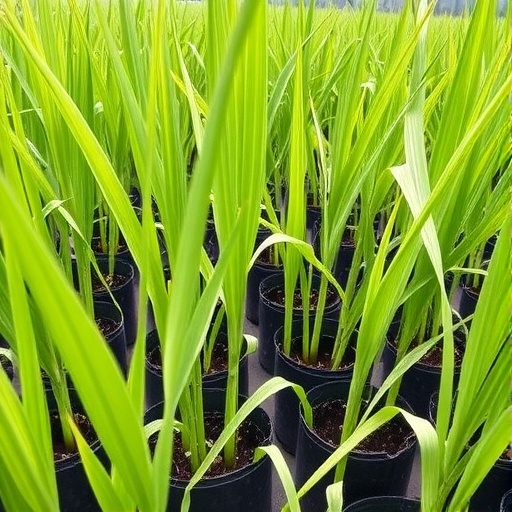Recent studies highlight the significant impact of chemical agents in agricultural systems, and among these, tricyclazole—a fungicide commonly used in rice cultivation—has drawn particular attention. Researchers have raised critical questions regarding its degradation in soils and subsequent absorption by rice seedlings. In the intricate ecosystem of rice paddies, understanding how soil aging processes affect tricyclazole behavior is essential not only for optimizing crop productivity but also for ensuring environmental safety. As such, the recent findings published in the journal Environmental Monitoring and Assessment shed new light on these concerns.
Tricyclazole is primarily utilized to combat diseases like rice blast, a severe issue that threatens yields worldwide. However, the longevity and transformation of this chemical within the soil matrix have implications that extend beyond mere pest control. The degradation of tricyclazole could alter its bioavailability, thus influencing how much of it is absorbed by rice plants. The implications of this can range from nutritional impacts on the crops to potential health risks for consumers.
The study led by Saini and colleagues investigates not only the aging process of tricyclazole in soils but also its implications for rice seedling uptake. The research team adopted a multi-faceted experimental approach, focusing on varying conditions to gauge both the chemical pathways and the biological responses of rice seedlings. In their analyses, parameters like soil pH, organic matter content, and microbial activity were meticulously recorded, as these factors significantly influence the degradation dynamics of tricyclazole.
Delving deeper into the chemical processes, the researchers found that tricyclazole undergoes hydrolysis, a process accelerated by changes in moisture and temperature within the soil. The study pinpointed specific degradation products formed during this process and assessed their potential toxicity. A notable outcome of the research indicated that under certain soil conditions, not all degradation products are benign, which raises concerns about their effects on plant health and soil ecology.
Highlighting the importance of understanding uptake mechanisms, the investigation quantified how much tricyclazole remained accessible to rice seedlings after varying aging periods. The results were startling; in some scenarios, an increase in the soil’s aging time was correlated with reduced uptake of tricyclazole by the seedlings, likely due to its binding to soil particles or the transformation into less absorbable forms. This led to questions about the optimal timing of fungicide application concerning planting schedules.
The implications of the findings extend to agricultural practices. Farmers relying on tricyclazole must consider the nuances of its application timing and the subsequent physical and chemical transformations it may undergo in the soil. Such insights can guide best practices, bolstering crop resilience while minimizing potential negative impacts on environmental health. Furthermore, this research highlights a need for developing guidelines on the safe incorporation of chemical agents within sustainable farming practices.
Considering the vast ecosystem linked to rice cultivation, the influence of degradation products generated from tricyclazole aging must not be overlooked. The potential for these compounds to affect microbial communities in the soil is an area warranting further exploration. Disruptions in soil microbiota could lead to broader ecological consequences, potentially undermining soil fertility, a cornerstone of sustainable agriculture.
The research team underscores the need for ongoing studies to assess the long-term environmental impacts stemming from the use of tricyclazole, especially in regions with intensive rice production. An ongoing dialogue among agronomists, environmental scientists, and policymakers will be crucial in addressing the challenges posed by chemical inputs in agriculture. Coordination efforts should focus on integrating scientific findings into practical applications that will benefit farmers while safeguarding ecosystems.
As the agricultural sector grapples with climate change and increasing food demands, studies like these blaze a trail toward more informed chemical use strategies. By elucidating the nuanced dynamics between tricyclazole degradation and rice seedling uptake, this research adds to the broader discourse on environmental stewardship in agriculture. We must prioritize innovative practices that enhance crop resilience against biotic stressors while also considering the implications of chemical use on soil and water systems.
Public awareness about the complexities of agrochemicals in food production must also be elevated. Stakeholders including consumers should be informed about the proactive measures being taken scientifically to ensure food safety in the face of chemical applications. This transparency not only fosters trust but also aligns consumer preferences with sustainable agricultural practices.
Overall, the findings from Saini and collaborators offer a valuable contribution to our understanding of agrochemical interactions in agricultural ecosystems. It prompts critical reflection on how we approach chemical use in farming—focusing on both efficacy and environmental responsibility. As agriculture continues to evolve, integrating research insights like those emerging from this study will be vital to addressing food security in a sustainable manner.
Maintaining the delicate balance between the utilization of agricultural chemicals and environmental stewardship will require an interdisciplinary approach. Scientists, farmers, and policy-makers should collaborate to create frameworks that support responsible chemistry use while maximizing agricultural output. By bridging the gap between understanding and action, future practices can be refined to support healthier crops and ecosystems for generations to come.
As we look forward to further elucidation on this topic, it is clear that the aging of tricyclazole and its implications for rice cultivation warrants continued research. The multifaceted nature of soil-chemical interactions, compounded by varying environmental conditions, presents both challenges and opportunities for those engaged in sustainable agricultural practices. By fostering ongoing studies and inquiries into this field, we are better equipped to formulate practices that are not only productive but also protective of our planet.
Subject of Research: Effect of tricyclazole aging in soils on its uptake in rice seedlings.
Article Title: Effect of tricyclazole aging in soils on its uptake in rice seedlings.
Article References:
Saini, R., Sethi, G., Marak, D. et al. Effect of tricyclazole aging in soils on its uptake in rice seedlings.
Environ Monit Assess 197, 1196 (2025). https://doi.org/10.1007/s10661-025-14648-5
Image Credits: AI Generated
DOI:
Keywords: Tricyclazole, rice seedlings, soil aging, uptake, environmental impact, agrochemicals, sustainable agriculture, soil microbiota.




